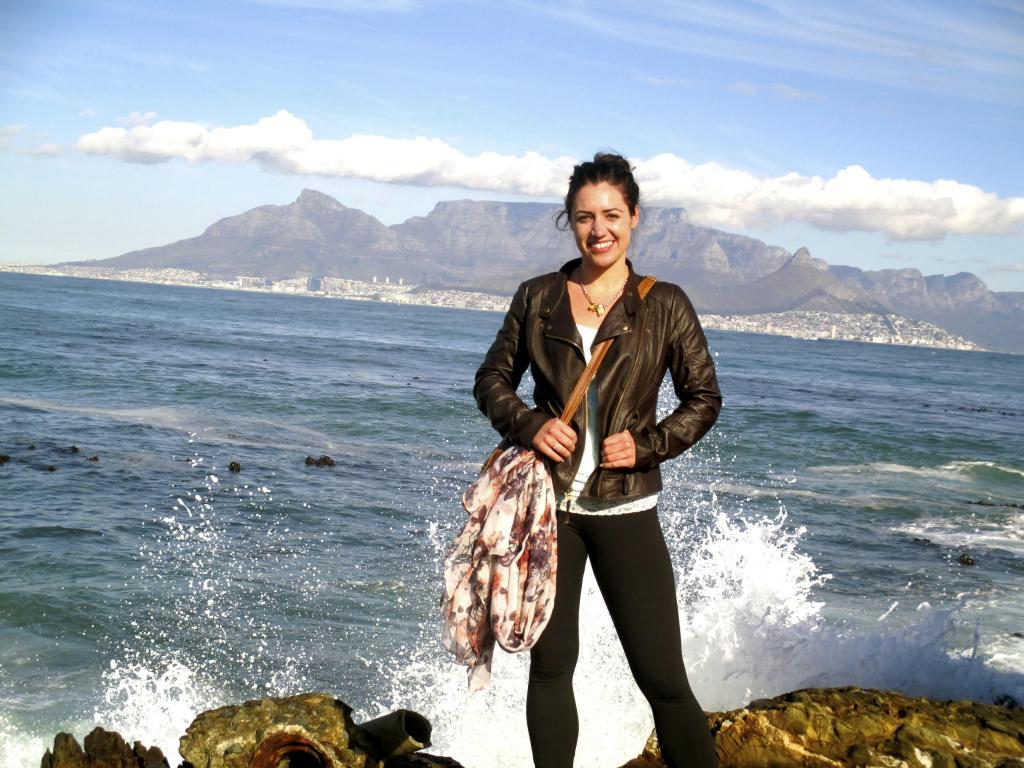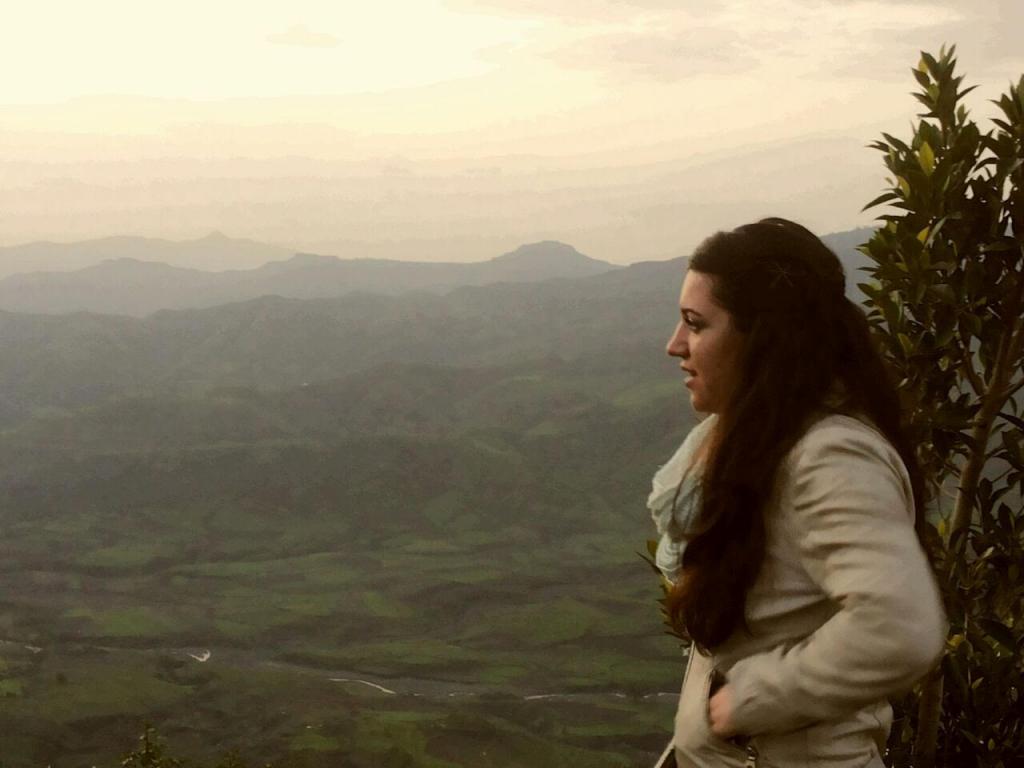Secondary menu
Spotlight: Hanna Gros, Co-author of No Life for a Child, IHRP Senior Fellow, and Graduate of U of T Law
September 28, 2016
Rona Ghanbari (3L)
Profile
Full name: Hanna Gros
Age: 27
Undergraduate degree: Psychology BA, McGill University
Year of Graduation from U of T Law: 2016
Aspirations for the future: I would like to practice refugee law for at least a few years, but I really enjoy the dynamic nature of research at the grassroots level and building an evidentiary foundation to guide progressive policy.

Robben Island, South Africa. Nelson Mandela spent most of his twenty-seven years of imprisonment on the Island, with Cape Town just across the water.
Hanna, you’ve been so active with the IHRP during your time at U of T Law, can you describe your involvement?
The IHRP was the reason I decided to come to U of T Law, so I got involved with the program as soon as I could. After participating in a refugee law working group during 1L, I did my first IHRP summer internship at the Population Council in Ethiopia. It was a truly eye-opening experience, not only because it challenged my notions of how ‘universal’ human rights should be implemented, but also because I had to reconsider the role of the law in the sphere of human rights advocacy. I came to law school with the hope of acquiring a powerful tool for human rights advocacy, but I realized that, in some contexts, the law is simply too blunt a tool to address the intricacies of systemic injustice. The law, no matter how powerful, is no substitute for education and social engagement at the grassroots level, which can often affect attitudes and social norms far more directly.
During my second year at U of T, I got involved with the IHRP as a clinic student and had the opportunity to work with Renu Madhane and Paloma van Groll, which was nothing short of inspiring. I learned a great deal about what it means to be truly dedicated to a project and to a cause through this experience. I was very excited to get started on the project, but I could not have anticipated that it would become a turning point in my career. Our research focused on immigration detention, and through the project, I co-authored a report entitled, We Have No Rights. Researching and writing this report made me realize that this tool of advocacy can be extremely effective in guiding and influencing policy and creating public awareness. I think one of the reasons that the report was so impactful was because we were able to bring together perspectives of people who experienced and interacted with the immigration detention regime from different angles. We interviewed lawyers, social workers, mental health experts, as well as current and former detainees. We painted a comprehensive picture of this convoluted system and revealed what we came to call “legal black holes.” But perhaps more importantly, the other aspect of the report that was particularly powerful was the profiled detainees and former detainees that revealed their lived experiences, and provided readers with an opportunity to empathize with them.
Following my second year at U of T, I did an internship at the UN High Commissioner for Refugees in South Africa. I worked with incredibly dedicated people who truly took on their professional duties as a personal mission. The UNHCR is a unique branch of the UN because, in addition to working with partner NGOs and government agencies, UNHCR personnel also have direct contact with refugees and asylum seekers on whose behalf they advocate. This allows the UNHCR to influence policy in an informed and powerful way, but collaborating with governments on such a large scale also slows down the process. There is a heightened awareness of the political implications of the UN’s criticism that often dilutes advocacy messaging. This was especially critical in South Africa, where the recent history of apartheid has created a culture intensely aware of human rights that fuels fierce and persistent activism.
Through the IHRP, I had the privilege of engaging in human rights advocacy from various angles: internationally and domestically, with non-governmental and inter-governmental organizations, and at the grassroots and policy levels. My experiences solidified my commitment to human rights work.
What would you say was one of the biggest learning or eye opening experiences you’ve had through the IHRP and throughout your travels?
The most powerful experiences I had through the IHRP were interviewing individuals who’ve had their human rights violated: activists and lawyers in Ethiopia, refugees and asylum seekers in South Africa, and migrants in jails across Ontario. There were these moments that were just heartbreaking, and I would walk away from those conversations emotionally exhausted but also filled with an immense sense of purpose.
During my internship at the UNHCR in South Africa, I interviewed a refugee who was one of the most resilient people I’ve ever met. After describing his story to me at length, he asked me, “What’s going to happen to my family?” I opened my mouth, hoping that maybe some words would fall out in some sensical order. I started saying that I could only offer him the options that the UNHCR has set out, but he seemed to pick up on my struggle. “I’m not asking you as a UN officer; I’m asking you as a human,” he said. I was at a complete loss for words.
I thought about that moment many times since, and I wondered what I could have possibly said in response. But I think my silence was the most honest acknowledgement of our powerlessness in the face of the inadequate and slow-moving international human rights mechanisms that have been set out by world leaders in far away and disconnected lands. And I think an honest acknowledgement is far more powerful than eloquently scripted, cold answers.
There are certainly moments of helplessness, when all the thousands of pages you read and study, all your professional achievements, and all the intellectual excellence you pick up along the way, feel entirely futile. And all you could rely on is simply being a human, capable of connecting with another human, capable of feeling empathy. Because empathy is at the heart of human rights advocacy.
I have yet to find someone who put it better than Dr. Payem Akhavan:
“The struggle for human rights cannot be reduced to sanctimonious platitudes and superficial sentimentality. What moves us to serve humanity, to achieve meaningful change, is genuine empathy. The capacity to feel the pain of others, to experience an intimate shared humanity, to accept discomfort and sacrifice in the path of a greater cause. In entering an authentic communion with others, we also discover a profound expression of our own dignity.”
I’ve been asked several times why I’ve chosen to work with people who’ve undergone such tragedies and suffering, on the assumption that such trauma is somehow contagious. I think that it’s important to distinguish between sympathy and empathy. The former is far more painful than the latter because sympathy is an emotion that leaves you powerless; it does not involve any true responsibility beyond feeling pity; it does not demand any impactful response. When we are courageous enough to feel empathy, to truly listen, to take on and internalize another person’s struggle as part of our own, we are driven to do something about it. And at least in my opinion, that is the most fulfilling and empowering way to leave a mark on this world. It’s the most meaningful way to live.

Lalibela, Ethiopia
How did you make the transition from student to employee of the IHRP?
The transition was very smooth, maybe too smooth. Sometimes I forget that I’m not a student anymore, I just get to work exclusively on my favourite part of law school. And working with Samer Muscati has been just incredible. He has been a wonderful mentor to me. In addition to having a great collaborative working relationship, he has also inspired me to consider doing more front line field research. He has really emphasized the importance of acknowledging our subjectivity as human rights advocates, and instead embrace our responsibility to be balanced, fair, and accurate in our research and reporting.
What was the biggest challenge in researching and writing No Life for a Child?
The biggest challenge was definitely figuring out the recommendations of the report. With this report, we tried to make specific recommendations for legislative and regulatory changes, and integrate input from various experts in the field.
Migration law is a complicated area of the law because its very foundation is discriminatory in the sense that migrants are treated differently than citizens. While the state has a basic right to treat migrants differently than citizens, if it’s not monitored closely, it can provide an opening for xenophobic biases to find expression in the law. I’ve encountered stories that I could only describe as Kafkaesque. For example, where an asylum seeker in Canada is asked whether she is afraid of returning to her country of origin, when she naturally replies “yes” – because she is seeking asylum, after all – she is detained as a flight risk who is unlikely to show up for removal proceedings. If she answers “no,” she undermines her status as an asylum seeker; if she answers “yes,” she is deprived of her liberty.
What advice do you have for students who are interested in getting involved with international human rights work/who wish to get involved with the IHRP?
DO IT. It’s incredibly meaningful work, and you seldom get the opportunity so early in your career to affect others’ lives in such a profound and positive way.
